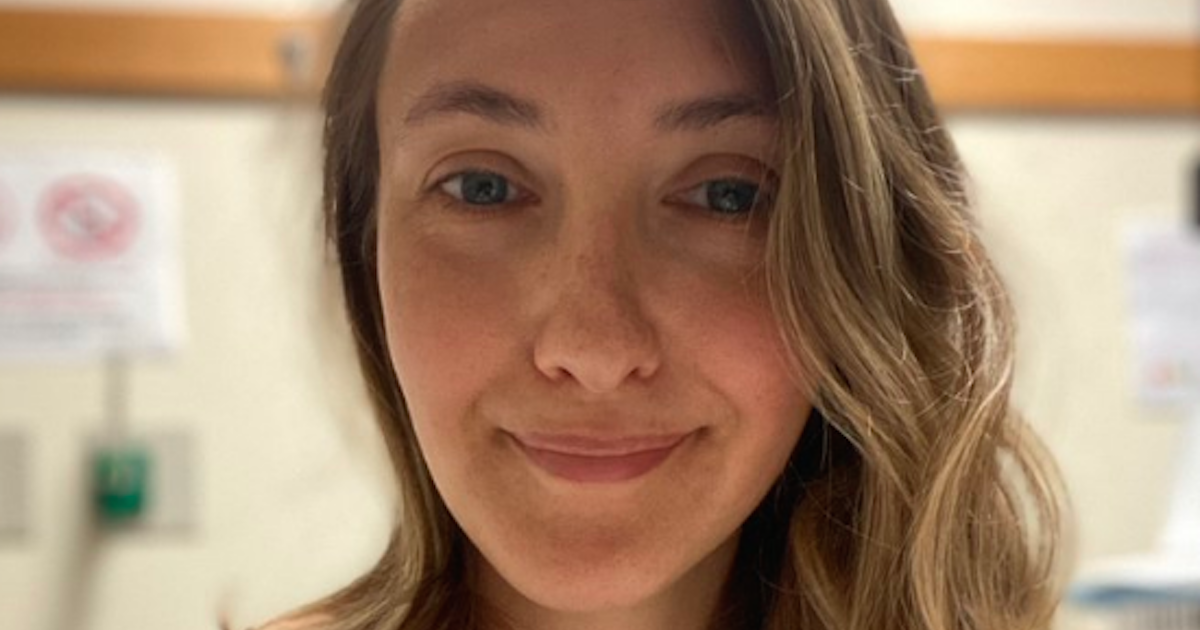Gratitude Through Hardship
- Victoria Lavine, a 37-year-old romance writer, is incredibly grateful that her breast cancer diagnosis turned into a best-case scenario ending as she’s now in remission.
- Earlier this year, Lavine was diagnosed with stage zero breast cancer, also known as ductal carcinoma in situ (DCIS), which refers to cancer that’s confined to the breast milk duct.
- After a mastectomy (surgical removal of one breast) and reconstruction, Lavine hopes her story can inspire others to self breast exams and be aware of their family history.
- Dr. Zuri Murrell, a colorectal cancer surgeon at Cedars-Sinai Medical Center, told SurvivorNet that his patients who live with gratitude, like Lavine, tend to handle treatment better because this attitude is one way to stay mentally healthy.
The mom of one and loving wife, who is now in remission and sharing her story to spread awareness, was diagnosed with stage zero breast cancer, also known as ductal carcinoma in situ (DCIS), which refers to cancer that’s confined to the breast milk duct.

Lavine, who ironically had been writing a romance novel with one of her characters being a breast cancer researcher, noticed the unusual lump during a self-exam in the shower.
She first thought to perform a self breast exam after noticing her left breast was more tender than usual before menstruation.
Expert Breast Cancer Resources
- Breast Cancer: Introduction to Prevention & Screening
- 6 Common Excuses for Skipping a Mammogram That You Need to Stop Using!
- Mammograms Are Still the Best Tool for Detecting Breast Cancer — A Warning About Thermography
- Breaking Down the Major Shift in Chemotherapy for Breast Cancer
- I Have Dense Breasts. Do I Need a 3D Mammogram?
- How to Avoid False Positive Cancer Results in Women With Dense Breasts: Ultrasounds Used in Addition To Mammograms
The discovery led her to get checked by a doctor who suspected the lump to be a cyst, however, she underwent a mammogram and a breast ultrasound to be certain.
Since the results turned out to be inconclusive, she then had a biopsy and an MRI done.
“I kept hearing, 'I don't think it's cancer,' all the way up until the news after the biopsy, and everyone was surprised,” she told TODAY.com.
In regard to the cancer being caught at an early stage, Lavine added, “I felt like I dodged a really big bullet. But I was in denial at first. I was like, ‘Thank goodness this isn't a super serious cancer.’ But it ended up being more serious than I expected it to be.”
Two months ago, I went MIA because I was diagnosed with breast cancer. Today, after a mastectomy, reconstruction, and LOTS of love and pain meds, I got the news that I'm in remission. No words can describe this feeling. 🥹💗#WritingCommunity #breastcancer #remission pic.twitter.com/XgLZxwbi6L
— Victoria Lavine 🖤 (@victoriaalavine) June 21, 2023
Since the cancerous area on her body was a certain size, Lavine’s doctor suggested she get a mastectomy. She ended up having the surgery done on June 7.
Lavine, who revealed to Twitter on June 21 that she was declared in remission, told TODAY.com, “I don't have to have chemo. I don't have to have radiation, and I don't have to have any hormonal therapies, so it is truly the best-case scenario and the happiest ever after I could hope for.”
She celebrated the news with a selfie on Twitter writing, “Two months ago, I went MIA because I was diagnosed with breast cancer. Today, after a mastectomy, reconstruction, and LOTS of love and pain meds, I got the news that I’m in remission. No words can describe this feeling.”
In a followup tweet, Lavine revealed how shocked she was that her story reached such a mass audience.
“Wow, I had no idea this would reach so many people! Since it has, I just want to encourage everyone to do a self exam, even if you have zero risk factors or family history (hi, that was me ),” she wrote. “That's how I found this so early. Love to all my other survivors!”
Understanding Stage Zero Breast Cancer
In order to reduce the fear around the very earliest stage breast cancer we want you to understand the definition and the debate around treatment.
Stage zero breast cancer, also known as ductal carcinoma in situ (DCIS), refers to cancer that's confined to the breast milk duct. There are two important facts about DCIS breast cancer:
1. It doesn't spread to other parts of the body.
2. The risk of death is essentially zero.
WATCH: What is Stage Zero Breast Cancer?
As we said, among breast cancer doctors there is some debate about how to treat DCIS. Some doctors don't even consider it a cancer, but rather a collection of abnormal cells or a pre-cancer, which is why some women opt for a watch and wait approach.
RELATED: Why Active Surveillance is Being Studied for Stage Zero Breast Cancer
Others may suggest the surgery route which usually involves a lumpectomy and potentially radiation as well. This somewhat more aggressive treatment (which is the standard protocol at major cancer centers) does have side effects, and potentially, long term effects.
You should ask your doctor about the very large study going on which is comparing outcomes and long-term impact for treatment vs. watchful waiting in stage zero breast cancer.
Learning About Stage Zero Breast Cancer (DCIS)
Less commonly, doctors and their patients will decide on more aggressive approaches depending on the amount of DCIS in the breast and a woman's specific risk factors for a future breast cancer. One reason some doctors may want to remove DCIS is if a biopsy reveals any evidence that a more invasive breast cancer could be present.
The good news about DCIS: it's usually always treated successfully (many oncologists do use the word cure in this situation), and you can take some time to digest the options, and then make a decision that's right for you.
Understanding Your Breast Cancer Risk
The risk of developing breast cancer varies greatly from person to person, so it's important to discuss your specific risk level with your doctor. That being said, there are some important risk factors to keep in mind.
Major Reduction in Cancer Risk by Following Old Standbys Diet and Exercise
In a previous interview with SurvivorNet, Dr. Elizabeth Comen, a medical oncologist at Memorial Sloan Kettering Cancer Center, laid out several risk factors for breast cancer including:
- Being a woman: Women are at a higher risk for breast cancer, though men can get the disease too.
- Age: "Breast cancer becomes increasingly more common as women age," Dr. Comen said.
- Family history: "Some people think that breast cancer is only inherited through genes on the mom's side,' Dr. Comen said. "But it can also be related to genetic mutations that could be found on the father's side."
- Having had a prior biopsy on an abnormal area: "There are different markers, that if a woman has had a biopsy, it's important that she talk to her doctor about whether those markers are lending themselves to an increased risk of breast cancer," Dr. Comen said. If you've had a biopsy that indicated atypical hyperplasia, for example, you are at an increased risk of breast cancer. Atypical hyperplasia isn't cancer, but it is a precancerous condition that describes an accumulation of abnormal cells in the milk ducts and lobules of the breast.
- Radiation exposure: Cancer survivors who've had radiation to their chest are at an increased risk of breast cancer.
- Lifetime estrogen exposure: "About 2/3 of breast cancer are driven by the hormone estrogen," Dr. Comen said. "So, that means if a woman has had her period at an early age and started to go through puberty at an early age, at seven, eight, nine, and potentially a later age of menopause, means that her lifetime of having had menstrual periods and being exposed to higher levels of estrogen is higher, and therefore her risk of breast cancer is slightly higher."
- Not having a child before age 30 or never having children
- Obesity
- Drinking alcohol
- Lack of exercise: “While there's more research to be done in this area, it looks like if a woman is not exercising, she may also increase her risk for breast cancer,” Dr. Comen said.
Gratitude Through Cancer
Gratitude: You've probably heard the word thrown around here and there when discussing complex concepts. But living with gratitude is quite simple in its meaning. It means being thankful for what you have, like Lavine is, and showing appreciation in your day to day life and it can be really helpful for those struggling with mental hardships.
Dr. Zuri Murrell, a colorectal cancer surgeon at Cedars-Sinai Medical Center, told SurvivorNet that his patients who live with gratitude tend to handle treatment better because this attitude is one way to stay mentally healthy.
How Can Gratitude Lead to a Healthier Mindset?
One reason this phenomenon is often reported anecdotally could be due to the reduction in stress level. Stress and anxiety can lead to physical issues, and practicing gratitude can help get both under control.
"The patients who do well with cancer, they live life with that kind of gratitude, but in terms of everything," he explained. "They're grateful, not for cancer, but they're grateful for an opportunity to know that life is finite."
According to the National Alliance on Mental Illness, multiple studies have indicated that learning to live with gratitude can lead to more happiness and less stress. One way to exercise gratitude is to take time to think about things you appreciate everyday, and some people find it helpful to write down those things in a journal.
Questions to Ask Your Doctor
- What can I do if I'm struggling to be thankful for what I have in my life?
- Are there local resources for people who wish to start practicing gratitude?
- Do you know of any research on the benefits of living with gratitude?
- What else can I do to help reduce my stress level?
Contributing: SurvivorNet Staff
Learn more about SurvivorNet's rigorous medical review process.

